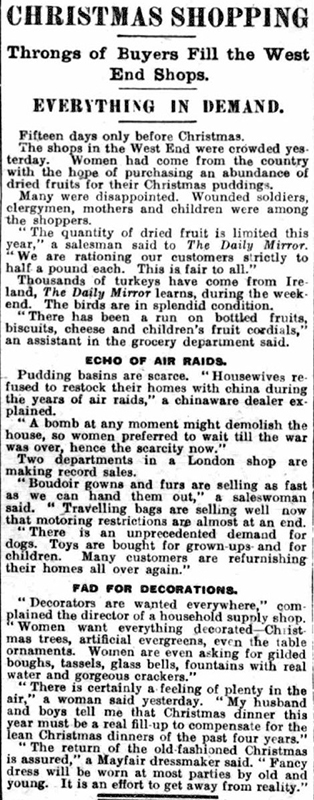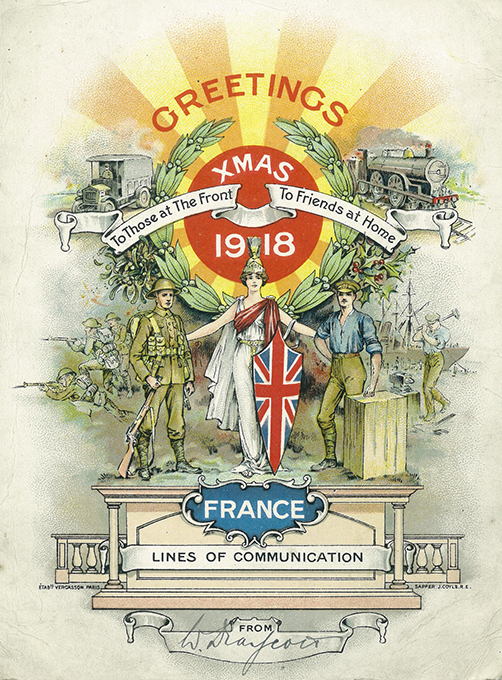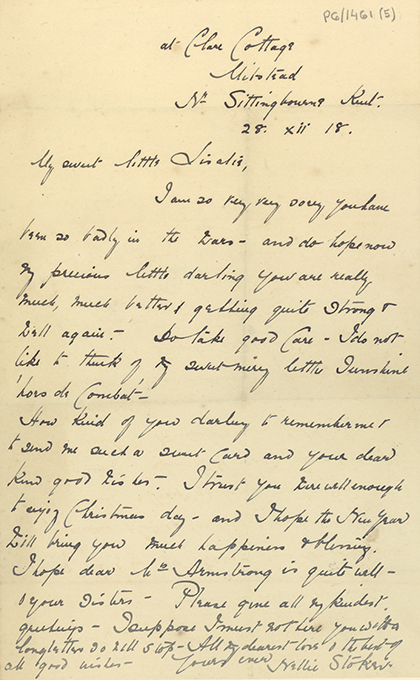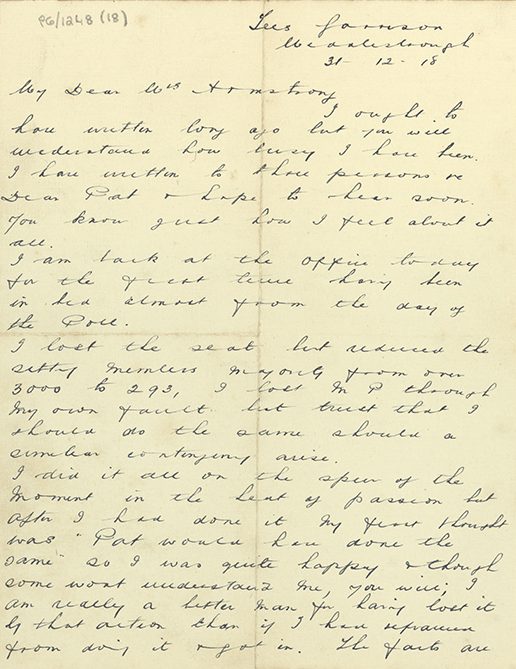WEEK 232-236: ALL ARE EQUAL WHEN WE LEAVE THE WORLD
Monday 2 to Sunday 31 December 1918
A general election was called in Great Britain immediately after the announcement of the Armistice, and held on 14 December 1918. It was the first time that all men over the age of 21 and women over the age of 30 were eligible to vote. The election, in which Captain Robert Gee canvassed as a candidate but failed to secure a seat, resulted in a landslide victory for David Lloyd George’s coalition government, which had steered the country during the war years. The election results were particularly dramatic in Ireland, where Sinn Féin republicans effectively wiped out the Irish Parliamentary Party. The outcome brought into the open the people’s deep-seated disapproval of government policy and heralded the beginning of the Irish War of Independence on 21 January 1919.
Politics was not the only issue which caused a storm as 1918 drew to a close. In November of that year, a committee under Frederick Kenyon, Director of the British Museum, presented the Imperial War Graves Commission with a report in which it recommended that bodies of the fallen should not be repatriated, and that the grave markers of those lost in the war should be of uniform design. Although the recommendations caused a public outcry, not least in Folkestone where Mrs Armstrong violently opposed them, the government supported the findings. Sir Herbert Baker, Sir Reginald Bloomfield, and Sir Edwin Lutyens – the three most highly respected architects of the day – were appointed to design the military cemeteries, and Rudyard Kipling was tasked with advising on the language to be used for memorial inscriptions.
Saturday 14 December
Letter from Thomas Tait Pitman to Mrs Armstrong
My dear Mrs Armstrong.
When I went to see Pat’s grave, (which was very soon after the Germans had retired from the Arras line) I am almost certain there were no railings. My brother and I were making a systematic search up and down the cemetery, some parts of which had been knocked about by shell fire, when my brother called out to me that he had found it. I think you had mentioned in your letter that we would know it by the railing, but I was so pleased to find all the flowers growing and in plume that I never thought anything about the railing. I have asked my brother what he remembered and he says he is sure there was no railing.
There was an old French civilian working in the cemetery clearing the weeds and digging out some of the paths, I expect he had been given a fee earlier in the war to keep the place tidy, but as you know between March and October the Germans were very much closer and the neighbourhood had suffered a good deal from shell fire. I remember saying as I left the cemetery that I hoped the graves commission would soon come along and clean the whole place up. They had made some of the cemetery further back very nice & tidy, whereas the Arras one had become a tangled mess. Now it appears from your letter that they must have overdone it. I can’t help thinking that the old flowers will still be found growing, and I am sure poor dear Pat would not have liked to see the graveyard in the condition I found it in. Of course it was nobody’s fault because it was in the shelled area. Of course I can imagine how you would prefer to go out and find it as I did, and we mustn’t be hard on the graves commission who have done much splendid work out here. Thousands and thousands of graves can now be identified which would never have been found but for them.
The question of headstones is a very difficult problem. I think myself that the only regulation necessary is as regards size. What one would like to avoid would be the erection of a vast monument to a rich officer and a tiny little one to the poor private. We have all fought side by side and are all equal when we leave the world and I would like to have exactly the same sized stone as one of my men. The shape of it I would like to leave to my friends and if my friends preferred a small white cross and the soldiers friends preferred a square stone, so be it. I know the whole question has raised a storm of indignation but some of the accusations I have seen in the papers have been very uncalled for, and no two people seem to think alike. One man wrote that there should be no stones allowed at all, just one monument in the middle of the cemetery. I am quite certain that it is absolutely impossible for anyone who has not seen the theatre of war to come to any real solution of the difficulty. In some cemeteries there are perhaps 100 buried in one trench.
I have written you this long letter because I know you feel very deeply on the subject and think some terrible injustice has been done. I’m sure all that has been done, has been done for the best. I’m sure the graves commission will be only too glad to listen to any suggestions, though they cannot act on them all as they vary so but we mustn’t attack them with a bayonet they have worked very hard indeed and taken a great many risks to fulfil their duty.
Yours sincerely
T. T. Pitman.
I have not answered your question as to how I think the railing came to be removed. I don’t think anyone had been in the cemetery for the last 6 months for reasons stated above, except probably the French civilian and it is quite likely that he cleared them away from excess of zeal. Pat’s grave looked so much more cared for than any of the others near by, that I can’t help thinking that some friend probably gave the old man a few franks when he visited the cemetery, and told him to keep an eye on it. Possibly shell splinters had broken it down beyond repair as some of the graves close by were struck.
Thursday 19 December
 Muz went round to Clodagh, & Jack came round & we took Tom out in the bath chair, & went down to the sea, the waves were lovely, & coming right over. We took her up in the lift! After lunch Muz went to C. again, as it was Lockwood’s last day. Jack came round, & we went down the town & shopped, & I got Muz a wee desk, then Jack & Tom went back, & I followed them back by the front. Jack left by the five train. Muz & I had a bath, Tom wrote letters. We wrote letters after dinner, & bed at about eleven.
Muz went round to Clodagh, & Jack came round & we took Tom out in the bath chair, & went down to the sea, the waves were lovely, & coming right over. We took her up in the lift! After lunch Muz went to C. again, as it was Lockwood’s last day. Jack came round, & we went down the town & shopped, & I got Muz a wee desk, then Jack & Tom went back, & I followed them back by the front. Jack left by the five train. Muz & I had a bath, Tom wrote letters. We wrote letters after dinner, & bed at about eleven.
Saturday 21 December
 Muz & I went round to C. at nine, but the man didn’t come till after ten, & he only put down a bit of the old linoleum, & half put felt under morning room carpet. I put a fire in mine & Muz’s rooms, & we did some tidying. We came back for lunch, as the man left at 1-30, & we got back at 3, & he worked till 5, but hardly got anything done. We came back for tea, & then went down the town, & went to Temple Barton about the house. Heppie took Tom out this morning. We wrote letters, & I did up parcels for Christmas, but we aren’t sending many. Muz & I wrote again after dinner.
Muz & I went round to C. at nine, but the man didn’t come till after ten, & he only put down a bit of the old linoleum, & half put felt under morning room carpet. I put a fire in mine & Muz’s rooms, & we did some tidying. We came back for lunch, as the man left at 1-30, & we got back at 3, & he worked till 5, but hardly got anything done. We came back for tea, & then went down the town, & went to Temple Barton about the house. Heppie took Tom out this morning. We wrote letters, & I did up parcels for Christmas, but we aren’t sending many. Muz & I wrote again after dinner.
Sunday 22 December
 Muz stayed in bed late, I tidied papers etc. then Miss Walters came. Then I took Muz to C. in the bath chair, & we did the felt under morning room carpet, got back late for lunch. Pelting afterwards so we wrote Xmas letters & did parcels & cards, & I helped Tom with her cards. Tom stayed in bed all day. Muz & I had a bath after tea, & then wrote more letters etc, & then weighed fruit etc for our plum pudding. Fruit is rationed this Xmas, & we were only allowed to buy it last Saturday, & then only 5 ozs each person.
Muz stayed in bed late, I tidied papers etc. then Miss Walters came. Then I took Muz to C. in the bath chair, & we did the felt under morning room carpet, got back late for lunch. Pelting afterwards so we wrote Xmas letters & did parcels & cards, & I helped Tom with her cards. Tom stayed in bed all day. Muz & I had a bath after tea, & then wrote more letters etc, & then weighed fruit etc for our plum pudding. Fruit is rationed this Xmas, & we were only allowed to buy it last Saturday, & then only 5 ozs each person.
Monday 23 December
 We were up early, & Muz went round to C. at nine, & I posted parcels etc, & followed her there, the man worked from 9-30 till one, & started the long stairs. I tidied the attic, & Muz tidied a lot of boxes etc, & we finished the attic, & swept it & the stairs & servants rooms. After lunch H. took Tom out, & Muz went to C, & found the man couldn’t get in, so he had gone. I went down to Sandgate, to get a woman to sew, & met Muz on the way back, & we went down the town, & got back late for tea. Afterwards we wrote letters etc & tidied. Wrote again after dinner, & bed at about 10-30.
We were up early, & Muz went round to C. at nine, & I posted parcels etc, & followed her there, the man worked from 9-30 till one, & started the long stairs. I tidied the attic, & Muz tidied a lot of boxes etc, & we finished the attic, & swept it & the stairs & servants rooms. After lunch H. took Tom out, & Muz went to C, & found the man couldn’t get in, so he had gone. I went down to Sandgate, to get a woman to sew, & met Muz on the way back, & we went down the town, & got back late for tea. Afterwards we wrote letters etc & tidied. Wrote again after dinner, & bed at about 10-30.
Wednesday 25 December
 Tom was the only one to have a stocking! K. came round, & we all went to church, & then took Tom on out on the front afterwards, & I went home early. K. came for lunch, & then he & Ione & Tom went up to the Grand, & Muz & I followed them, & we had tea up there, & Ione & Tom danced. K. dined at the Grand, & came on here about ten, & stayed till after eleven. Tom went to bed when we got back from the Grand. We went to bed at about twelve. In the night Muz came in to me for a bit.
Tom was the only one to have a stocking! K. came round, & we all went to church, & then took Tom on out on the front afterwards, & I went home early. K. came for lunch, & then he & Ione & Tom went up to the Grand, & Muz & I followed them, & we had tea up there, & Ione & Tom danced. K. dined at the Grand, & came on here about ten, & stayed till after eleven. Tom went to bed when we got back from the Grand. We went to bed at about twelve. In the night Muz came in to me for a bit.
Friday 27 December
 Ione stayed in bed all day, Muz & I went round to Clodagh at ten, to meet Mrs Hopper, & she worked at the ballroom curtains all morning, till after one. We helped her. Then she cut out Ione’s curtains, & took them home. K. came round after lunch, & we gave him toast & tea! & he left by the three train. H. took Tom out in the bath chair after lunch. It was raining this morning. Did the puzzle with Tom, & when she went to bed, wrote letters etc: Then H. & I went round to C., & brought a load of stores round, in the bath chair. Then H. brought me back in it! I was awfully tired.
Ione stayed in bed all day, Muz & I went round to Clodagh at ten, to meet Mrs Hopper, & she worked at the ballroom curtains all morning, till after one. We helped her. Then she cut out Ione’s curtains, & took them home. K. came round after lunch, & we gave him toast & tea! & he left by the three train. H. took Tom out in the bath chair after lunch. It was raining this morning. Did the puzzle with Tom, & when she went to bed, wrote letters etc: Then H. & I went round to C., & brought a load of stores round, in the bath chair. Then H. brought me back in it! I was awfully tired.
Saturday 28 December
 Ione stayed in bed all morning, & got up for lunch. H. took Tom out in the bath chair. Muz & I went down the town, but started rather late, so couldn’t do everything. H. took Tom out in the afternoon. Muz & Ione talked, & I worked at the ballroom curtains. I was going to help Miss Walters with her babie’s [sic] party, but didn’t go. After dinner I darned stockings, & Muz & Ione wrote letters. They went to bed at about twelve, & I stayed up till nearly two.
Ione stayed in bed all morning, & got up for lunch. H. took Tom out in the bath chair. Muz & I went down the town, but started rather late, so couldn’t do everything. H. took Tom out in the afternoon. Muz & Ione talked, & I worked at the ballroom curtains. I was going to help Miss Walters with her babie’s [sic] party, but didn’t go. After dinner I darned stockings, & Muz & Ione wrote letters. They went to bed at about twelve, & I stayed up till nearly two.
Nellie Stokes, Clare Cottage, Milstead, Nr. Sittingbourne, Kent, to Lisalie Armstrong
My sweet little Lisalie,
I am so very very sorry you have been so badly in the wars – and do hope now my precious little darling you are really much, much better & getting quite strong & well again. – Do take good Care – I do not like to think of my sweet merry little Sunshine “hors de Combat” –
How kind of you darling to remember me & to send me such a sweet card and your dear kind good wishes. I trust you were well enough to enjoy Christmas day – and I hope the New Year will bring you much happiness & blessing. I hope dear Mrs Armstrong is quite well – & your sisters – Please give all my kindest greetings – I suppose I must not tire you with a long letter so I’ll stop – All my dearest love & the best of all good wishes –
Yours ever Nellie Stokes
Monday 30 December
 Muz & I were up early & went over to C. Ione stayed in bed all morning, H. took Tom out in the morning, & Ione took her in the afternoon. The plumber came & worked at C. & his wee boy carried up coal, & I lit one fire, & he lit five. Mrs Hopper came up, & worked all morning, till one. She brought Ione’s curtains back finished, & we finished the landing ones & the ballroom ones. Two men came up to finish the back stairs, they came at ten, & again in aft: & stayed till about seven, & got it all finished. We kept the furnace stoked, & got a lot done. Muz & I cooked our own lunch & tea & had it in front of the fire, & it was lovely, we stayed till 7-30, & I loved it all. When we were at dinner the Kirwans arrived, & we sat & talked, & bed at about twelve.
Muz & I were up early & went over to C. Ione stayed in bed all morning, H. took Tom out in the morning, & Ione took her in the afternoon. The plumber came & worked at C. & his wee boy carried up coal, & I lit one fire, & he lit five. Mrs Hopper came up, & worked all morning, till one. She brought Ione’s curtains back finished, & we finished the landing ones & the ballroom ones. Two men came up to finish the back stairs, they came at ten, & again in aft: & stayed till about seven, & got it all finished. We kept the furnace stoked, & got a lot done. Muz & I cooked our own lunch & tea & had it in front of the fire, & it was lovely, we stayed till 7-30, & I loved it all. When we were at dinner the Kirwans arrived, & we sat & talked, & bed at about twelve.
Tuesday 31 December
 Muz, Tom & I went round to meet the Kirwans, & met them coming to us. We waited about for Ione, & then went out on the front, as we missed her. It rained in the morning, & all afternoon too. After lunch Mrs Mathews came, & we all went round to the Burlington, to the Ks. We sat & talked, then went to C. & I stoked the furnace again. I had also swept the Kitchen & pantry. Then the Ks & Dolly Thurburn came back here for tea, & the Ks stayed for dinner, & we talked afterwards about K’s man. We sat up to see the new year in, & the raid sirens went off, it woke Tom, I peeped in at her, but she was only half awake! But Muz went in. We went to bed at about 1-30, after having tea etc.
Muz, Tom & I went round to meet the Kirwans, & met them coming to us. We waited about for Ione, & then went out on the front, as we missed her. It rained in the morning, & all afternoon too. After lunch Mrs Mathews came, & we all went round to the Burlington, to the Ks. We sat & talked, then went to C. & I stoked the furnace again. I had also swept the Kitchen & pantry. Then the Ks & Dolly Thurburn came back here for tea, & the Ks stayed for dinner, & we talked afterwards about K’s man. We sat up to see the new year in, & the raid sirens went off, it woke Tom, I peeped in at her, but she was only half awake! But Muz went in. We went to bed at about 1-30, after having tea etc.
 Letter from Captain Robert Gee, Lees Garrison, Middlesbrough, to Mrs Armstrong
Letter from Captain Robert Gee, Lees Garrison, Middlesbrough, to Mrs Armstrong
My dear Mrs Armstrong.
I ought to have written long ago but you will understand how busy I have been. I have written to three persons re Dear Pat & hope to hear soon. You know just how I feel about it all. I am back at the office today for the first time having been in bed almost from the day of the Poll. I lost the seat but reduced the sitting members majority from over 3000 to 293, I lost MP through my own fault but trust that I should do the same should a similar contingency arrive. I did it all on the spur of the moment in the heat of passion but after I had done it my first thought was “Pat would have done the same” so I was quite happy & though some won’t understand me, you will; I am really a better man for having lost it by that action than if I had refrained from doing it & got in.
The facts are as follows: I discovered my agent was not running straight over money matters he was out for corruption & I warned him against it, later I found he was still doing it, he also told me two deliberate lies re money. I also had a complaint about his conduct to a girl clerk & so I sacked him on the spot. He told me it would cost me the election & I kicked him out of the room. Pat would have done quite the same only he would not have lost his temper & I did. The experience I gained is great & I shall win next time. We had a quite Xmas but we were all together. I do hope Tommy is better. Heaps of love to all.
yrs affectionately
Robert Gee
PS It was my party who knocked out Macdonald, Henderson, Anderson & Jowett.1
- Ramsay MacDonald (1866-1937), co-founder of the Labour party and first Labour politician to become Prime Minister; Arthur Henderson (1863-1935), co-founder of the Labour party, its leader for three separate terms in three different decade, and winner of the 1934 Nobel Peace Prize for his support for the League of the Nations and disarmament in his role as President of the World Disarmament Conference in Geneva in 1932; William Anderson (1877-1919), British socialist politician and MP from 1914 until 1918; Fred Jowett (1864-1944), British Labour politician and MP from 1906 to 1918. All four men lost their seats in the 1918 election for their opposition to Britain’s involvement in the First World War. ⇑







